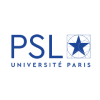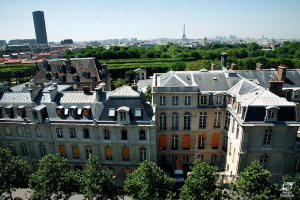60 Rue Mazarine, 75006 Paris, France
Career Counselling

Université PSL is a unique institution of higher education in Paris, France. It is dedicated to excellence in teaching, research, and training. It was created in its current incarnation in 2010, when many of the oldest and most prestigious colleges in France came together. It is home to 17,000 students, of whom 20% are from outside France. Two thirds of all students are postgraduates, reflecting the commitment of the University to high level research.
The eleven constituent Schools of PSL University are the College de France, the Nati...
| Establishment year | 2010 (as PSL University) 1530 (Oldest College) |
| Total Students | 17,000 |
| International Students | 3,400 |
| QS World University Rankings 2024 | 24 |
| Campus Size | N/A |
| Total Number of Campuses | 14 (of 11 constituent colleges) 8 (associate colleges) |
| University Website | https://psl.eu/en |
| No. of Schools and Divisions | 11 Constituent Colleges / Schools |
| Nobel Prize Winner Alumni | 28 |
| No. of Education Programs | 10 (undergraduate), 49 (Master’s) |
| Student to Faculty ratio | 5.9:1 |
Université PSL offers undergraduate and postgraduate courses through 11 Colleges, which are also referred to as Schools. Many of these are further divided into Laboratories.
The eligibility criteria for Master’s courses vary by program; details can be found on individual degree webpages. Some programs select based on the application alone, while others require candidates to apply for personal interviews, written and oral examinations, or a competition based on a research problem. Language examinations may also be held for courses where the medium of instruction is English.
The application package for graduate programs at PSL includes a detailed CV, a statement of purpose, academic / industrial references, and other supporting documents. Each Master’s program also has a set of Bachelor’s programs which are recommended prerequisites for applicants.
Undergraduate applicants to PSL must hold a valid high school diploma, Different courses may require specific subjects in the high school secondary certificate. Summaries of degree-specific requirements can be found on individual School websites.
All courses at PSL have a set of language proficiency requirements. These can be found on the relevant program webpages. In general, courses taught in French require the applicant to have a level of at least B2 or C1; scores from the DALF or DELF examinations can be submitted in support of this. Courses taught in English require a C1 level of proficiency; a wide range of test scores, including TOEFL, IELTS, GMAT, Cambridge, and Pearson certificates, may be submitted.
Applicants to Master’s Programs at Université PSL must complete the following steps:
Undergraduate applicants to the University follow a similar procedure. The admission process differs according to whether a candidate is applying to CEPS multidisciplinary degree, a Bachelor’s degree in sustainability sciences, or any other UG program.
Academic certificates and degree transcripts must be officially translated into French. Most international students organize this process via the French Embassies in their home countries.
After receiving an offer of admission from PSL, students from outside the European Economic Area must apply for a
long term French visa with residence permit (VLS-TS) via the French Embassy or Consulate.
International Master's students at Universitè PSL pay tuition fees of 243 Euros per year for most degrees. Some courses, like Material Sciences, Nuclear Energy, and Integrative Chemistry, have higher tuition fees that can be found on the individual program websites.
Undergraduate students enrolled in multidisciplinary degrees and sustainability Bachelor’s programs pay tuition fees of 170 Euros per year. Other UG degrees have variable tuition fees which can be found on the relevant course webpages.
All students must also pay the annual campus tax of 92 Euros. This is used to fund core student services, like free healthcare. International students in France must purchase a liability insurance package. Public transport for students costs less than one Euro per day through the Imagin'R pass, which gives access to the entire metro and bus network.
The University recommends that students budget between 600 and 900 Euros per month towards accommodation and food costs, with central Paris being significantly more expensive than the suburbs. To successfully apply for a residence permit in France, international students at PSL University must present proof of access to at least 615 Euros per month. Students also spend on recreation, entertainment, and study materials.

The Université PSL campus is spread over several locations, primarily in central Paris. Seven main libraries are located on various campuses. Swimming pools, gyms, tennis courts, golf courses, and climbing walls are easily accessible from all locations.
PSL Sport is the umbrella organization that coordinates all athletic activities at the University. There is a unique system by which students who are enrolled in a particular sport can earn Athletic Credits based on their attendance, performance, and participation; these are compatible with academic credits earned and are reported on transcripts. Over 30% of students at PSL are enrolled in a sports program, and there are more than 30 sports to choose from.
Union PSL coordinates all student activities at the University. It brings together students from different schools through academic, cultural, and sports events, as well as social gatherings. It organizes annual events like Trait d'Union, the student DJ party, la Castagne, the University Sports League; and Semaine de la Pensée, a week dedicated to seminars and group discussions on important social topics.

Students at PSL are encouraged to take up internships to give them experience in corporate or research life. International students can work up to 964 hours per year with a work permit.
The PSL Welcome Desk provides assistance and orientation sessions for international students at the University. There is a 24x7 helpline to help members of the University community who suffer from harassment, discrimination, bullying, or violence.
International students at PSL University must deal with the high cost of living in Paris. Keeping this in mind, the University offers many options for students to fund their academic and living expenses. To be considered for all eligible scholarships, students must fill the Social Student Dossier at the time of admission; this is used for both housing and scholarship allocation. This form is to be filled between January 15 and May 31 every year.
The most common type of scholarship is Financial Aid; this is awarded based on the family income of the student. This is awarded in seven Levels: students who fall in Level 0 pay no tuition or social security fees. Students at other levels pay tuition fees between 1,009 and 5,551 Euros per year.
Merit Scholarships at PSL are the most prestigious financial aid options. These are available to both undergraduate and postgraduate students. UG winners are offered the scholarship if they have achieved high honors (or equivalent) in their high school secondary examinations. Entrants to Master’s programs are awarded merit scholarships if they have displayed exceptional academic performance during their undergraduate degree. This Scholarship awards 900 Euros per year for up to three years of a degree.
Emergency aid is available to students experiencing severe financial difficulties, and is awarded either at one time or annually. One time grants are capped at 1,665 Euros. Annual emergency aid cannot exceed 4,768 Euros. The funding is provided by a French government department.
There are also other scholarships available for citizens of certain countries studying in France; students are encouraged to check with the French embassies in their country of origin before applying to PSL University.
Finally, students below the age of 28 can apply for student loans of up to 15,000 Euros; these have lenient payment deferral options, and a part of the risk of the loan is borne by the Government of France.
